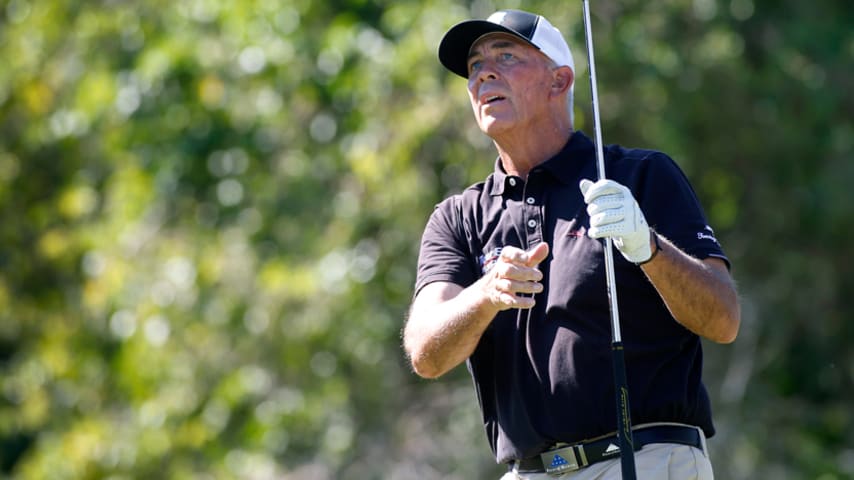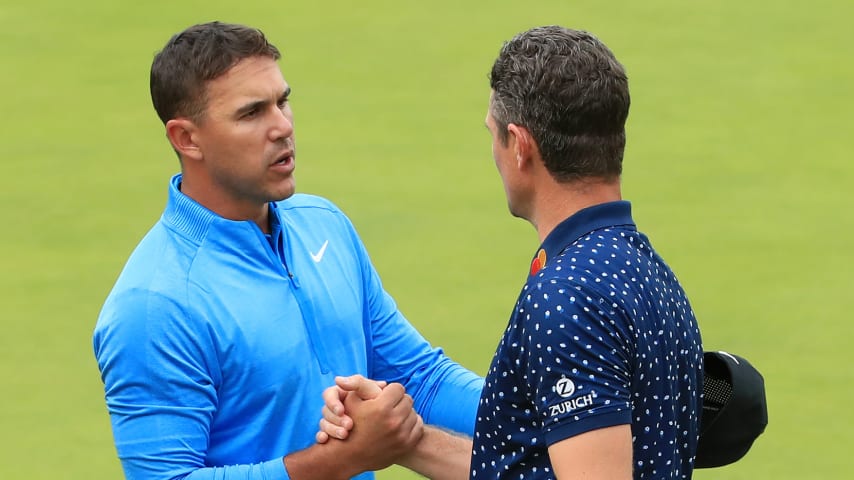A moment of silence that speaks volumes
6 Min Read

FORT WORTH, TEXAS - JUNE 11: Gary Woodland of the United States and Phil Mickelson of the United States take part in a moment of silence in place of the 8:46 tee time to honor George Floyd while on the 13th tee during the first round of the Charles Schwab Challenge on June 11, 2020 at Colonial Country Club in Fort Worth, Texas. (Photo by Ron Jenkins/Getty Images)
Written by Mike McAllister

Moment of silence at Charles Schwab Challenge
FORT WORTH, Texas – Zack Rasego, one of the few black professional caddies working the various tours in America, stood in the middle of the first fairway at Colonial, his fellow South African Christiaan Bezuidenhout having started his opening round of the Charles Schwab Challenge with a perfect drive.
Ryan Palmer, the Colonial member and local resident given the honor of hitting the first shot on the PGA TOUR in three months, had just arrived on the ninth green. His 56-foot putt for birdie was going to be a difficult one.
RELATED:Monahan: 'We should communicate and learn' | WATCH: Varner III, Monahan talk social injustices, solutions
Several people – officials, media members, a handful of players, caddies and coaches on the nearby practice green, but no fans, of course -- were scattered around the first tee. Some wore masks to help prevent the spread of the coronavirus that has impacted the entire world. But the tee box itself was open. PGA TOUR Commissioner Jay Monahan stepped in front of a camera to say a few words.
As the PGA TOUR commits to amplifying the voices and efforts to end systemic issues of racial and social injustices, we have reserved the 8:46 tee time to pause for a moment of silence, prayer and reflection. Thank you.
Mark Russell, Vice President of Rules and Competition, then spoke into his walkie-talkie, giving the orders to suspend play Thursday morning. Three short blasts from various airhorns followed, and Colonial went quiet, save for the whirl of a few portable generators. Players and caddies who were spread out across the 18 holes in the morning wave bowed their heads.
It was time to think about George Floyd … and the 8 minutes and 46 seconds that former Minneapolis police officer Derek Chauvin kneeled on his neck, causing Floyd’s death and sparking protests not only in the U.S. but around the world, with conversations centering on the tragedy and the changes needed to prevent another one.
The idea for the 8:46 moment of silence – it will be held during every round this week, including the Korn Ferry Challenge at TPC Sawgrass in Florida -- came from the PGA TOUR’s Inclusion Leadership Council. As Commissioner Monahan said on Wednesday, the TOUR wants “to be part of the dialogue and to engage on this incredibly important topic at this incredibly important time.” A recent on-camera discussion with Harold Varner III was another example, as are the internal groups designed to not only discuss the issues but take action steps, helping to make the TOUR accountable for diversity and inclusion
“We’re doing a lot as a business,” Monahan said. “I am not claiming that we’re perfect. We’re on a journey. But it’s an organizational commitment.”
Of course, the faces of the TOUR are its incredibly talented golfers, and what they say carries significant weight. As one of the handful of African-American members on the tours, Varner realizes what he says and thinks is important, that racism and social injustice need to be addressed.
He’s heard from several of his fellow pros – white pros, that is – who have told him they want to pay attention, they want to do something. He realizes there may be an underlying feeling of guilt for not having aggressively confronted the issue.
“Some of the guys that texted, I’m like, ‘Dude, you’re not racist. I think you’re doing things to grow the game, like your representation on the PGA TOUR,’ ” Varner said. “But I think it’s going to show that they’re going to look at black people a little differently.”
Varner sees access to golf for all people, regardless of skin color or background, as a key to addressing the situation in his sport. The more diverse golf becomes, the more it can discuss the problems from a personal level. For now, few golfers can offer the perspective that athletes in other sports have, especially in the NBA.
“The NBA is way more vocal because they come from a different background than most golfers, so when they're speaking about it, they've experienced a lot of the stuff that is going on,” Varner said. “They're going to be way more vocal than most people, me included, so that's where I think that people think the NBA is doing more. I think they have more people that participate in the NBA that are exposed to those things that are happening right now.”
But, Varner promised, “If I'm experiencing something, I'm going to be way more vocal.”
Significantly more people might hear him the rest of this week after his opening 7-under 63 on Thursday afternoon gave him a share of the first-round lead with Justin Rose. But he's not looking ahead to what the greater implications might be should he win this week.
"The reason I have a platform is because I'm really good at golf," he said after his round. "I just need to focus on that."
Like Varner, the world’s top-three ranked players were not yet on the course Thursday when the 8:46 horn blew. Rory McIlroy, Jon Rahm and Brooks Koepka are in the same threesome, and they had a late tee time. They will, however, be on the course for Friday’s moment of silence. They are willing to speak out, to get involved.
“It’s important to set the tone,” Koepka said. “I think it’s going to be special. … There needs to be change, and I want to be part of the solution.”
“I understand you can't make everybody aware of everything, but if I can just have one more person understand the situation and support it, to me it's a win, right?” added Rahm. “… It’s become the biggest civil rights movement in history.”
World No. 1 McIlroy, asked about 8:46 earlier in the week, called it a “wonderful gesture.” Like most golfers of his generation, his biggest inspiration was an African-American -- Tiger Woods.
“Tiger doesn't look the same as me, has had a very different upbringing to the one that I have had, but he was my hero growing up, and it didn't matter what color his skin was, what his beliefs were,” McIlroy said. “… We've been very lucky to have him in our game.
“I think that there should be more people like him in golf, and I think what the conversation that Jay and Harold Varner had about these issues I think really hit home with me. Harold said, it maybe just isn't about the players, it's about everyone in the game of golf. There's so many people that are involved with the game, and as long as we continue to give people from different backgrounds opportunities to be in golf, that can only be a good thing.”
A moment of silence is one thing. The key after this week, of course, will be to sustain the conversation, then put those words into action. Varner realizes some who bowed their heads at Colonial may move on, but he’s confident the TOUR will continue to keep diversity and inclusion at the forefront of its initiatives.
“This week,” Varner said, “won’t be the last week.”












